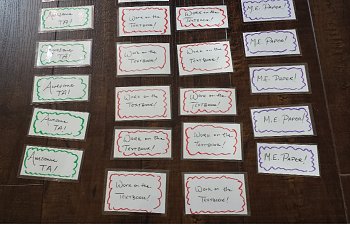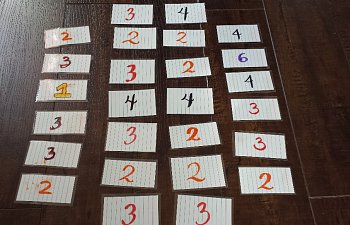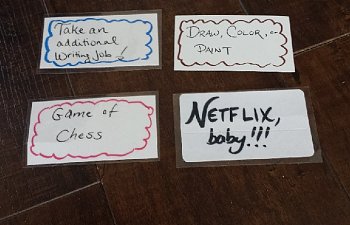Okay, so in my former life as a teacher, one of the most useful things I did was to produce cards. Cards of various sorts; cards of all shapes and sizes.
It was really useful to make games or create interesting methods of problem-solving. It didn't so much take the 'art' gene as the 'non-linear thinking' gene to come up with these, and often having things to actually hold seemed to help student learning.
Awhile back, I came across a post that discussed creating a list of no more than six goals for the year, prioritizing them, and then delegating a certain percentage of your free time to each. The first three goals got a huge amount of your time; the top goal was set at maybe 40%, and the last goal was maybe 5%. (I can't find the original article that discussed this, mainly because when I enter 'goals' and 'percentage time' I get all sports, all the time.)
Goal setting with ME sucks. You can never be sure you'll have the energy to complete a task, much less one so huge as a yearly goal often is. But I was finally well enough to have some free time where I was just sitting around not doing much of anything, and wanting something to do. So I fell back on my idea of making cards.
First, I prioritized my six goals. Goal 1 was to be an awesome T.A. As T.A., I might grade work, make extra videos or worksheets or simply check in with students who weren't doing so well. Goal 2 was to finish the rough draft of that chem textbook I've been working on for forever. Goal 3 was to finish my paper on M.E., and so on.
I took index cards and cut them up into pieces large enough to read, but small enough so as not to be wasteful. I made maybe 35 to 50 of these cards, and then used some rough percentages to make there be about a 40% likelihood that I would choose a card with my first goal.
View attachment 15366
Now. How long does it take to do these tasks? Sometimes you feel more active than others, and some tasks it takes longer to really move forward than others: the textbook and the M.E. paper were like this for me.
On the back of each card, I wrote a range of time I might be involved in that task, with the minimum amount being the least amount of time it takes to become really involved and make progress.
View attachment 15367
These are the same cards as in the image above, so you can see that 'Work on the Textbook' ranges from 2-4 hours, while the M.E. paper runs 2-6 hours, with a tilt in favor of more time spent. It really does take me longer to work through the scientific jargon. Being an awesome T.A. has lower values, because it takes a lot less time to answer student emails or write up some practice problems than it does to wade through a scientific paper... for me, anyway.
Maybe your cards will be lower; maybe they'll say '10 min'. Maybe there won't be anything longer than an hour. This is not about forcing yourself to crash; you should do whatever works best for you based off of what you know about your own illness.
Then, I threw a few individual cards in there for fun: just one that says NETFLIX BABY because I enjoy the Netflix binge as much as the next person (or maybe a little more). One suggests I paint or engage in otherwise artsy stuff. I only made a few of these wildcards, because the point is to be productive, natch.
View attachment 15369
Yes, silly, but the idea of getting down to business and pulling the Netflix card is pretty enticing. Like your lotto ticket winning you $4.
Then, I laminated these cards with my handy-dandy laminator, and cut them out.
Finally, here's how I use them. When:
When I'm done, I put the card back into its holder, which is supposed to be a holder for Post-It notes.
This has been surprisingly effective for me personally. I really like the idea of the work being something of a mystery, but the proportion of what I end up doing being about right. I love the variety of having about 10+ tasks. I feel no guilty compunction to pull a card on days when I'm too tired or busy; this is for when I'm bored and have free time and a bit of extra energy. Yet the card, with its timeframe written on the back, really does encourage me to do more than I otherwise might.
Seriously, these are just a tool. I mean, couldn't I just sort of do this proportionally, hour-wise? From a list?
Yes. Yes I could. But the cards make it more fun, and I can't lose track of how much else I've done where. Moreover, given the card frequency, I have literally pulled every single card type at least once, so this makes it really hard to be bored, even with tasks that stretch out over months, as these do.
These were fun for me to make, and appealed to both my more scientific, mathy side, and my more paint-outside-the-lines creative side, but this idea may not be for you. For one thing, you'd have to have ANY extra time or energy. However, it's been helpful to me so far this year.
If you were waiting for the next gardening installment, I'm sorry to disappoint you! More next time,
Jaime
It was really useful to make games or create interesting methods of problem-solving. It didn't so much take the 'art' gene as the 'non-linear thinking' gene to come up with these, and often having things to actually hold seemed to help student learning.
Awhile back, I came across a post that discussed creating a list of no more than six goals for the year, prioritizing them, and then delegating a certain percentage of your free time to each. The first three goals got a huge amount of your time; the top goal was set at maybe 40%, and the last goal was maybe 5%. (I can't find the original article that discussed this, mainly because when I enter 'goals' and 'percentage time' I get all sports, all the time.)
Goal setting with ME sucks. You can never be sure you'll have the energy to complete a task, much less one so huge as a yearly goal often is. But I was finally well enough to have some free time where I was just sitting around not doing much of anything, and wanting something to do. So I fell back on my idea of making cards.
First, I prioritized my six goals. Goal 1 was to be an awesome T.A. As T.A., I might grade work, make extra videos or worksheets or simply check in with students who weren't doing so well. Goal 2 was to finish the rough draft of that chem textbook I've been working on for forever. Goal 3 was to finish my paper on M.E., and so on.
I took index cards and cut them up into pieces large enough to read, but small enough so as not to be wasteful. I made maybe 35 to 50 of these cards, and then used some rough percentages to make there be about a 40% likelihood that I would choose a card with my first goal.
- Be an awesome T.A.! ------------------ 40%
- Finish textbook rough draft! ---------- 20%
- Finish M.E. paper! ---------------------- 20%
- Apply to schools! ------------------------ 10%
- Earn at least $100 a week writing! --- 5%
- Finish [two specific works of fiction] - 5%
- (50)(0.4) = 20 cards
- (50)(0.1) = 10 cards
- ...and so on
View attachment 15366
Now. How long does it take to do these tasks? Sometimes you feel more active than others, and some tasks it takes longer to really move forward than others: the textbook and the M.E. paper were like this for me.
On the back of each card, I wrote a range of time I might be involved in that task, with the minimum amount being the least amount of time it takes to become really involved and make progress.
View attachment 15367
(Hours, not minutes!)
These are the same cards as in the image above, so you can see that 'Work on the Textbook' ranges from 2-4 hours, while the M.E. paper runs 2-6 hours, with a tilt in favor of more time spent. It really does take me longer to work through the scientific jargon. Being an awesome T.A. has lower values, because it takes a lot less time to answer student emails or write up some practice problems than it does to wade through a scientific paper... for me, anyway.
Maybe your cards will be lower; maybe they'll say '10 min'. Maybe there won't be anything longer than an hour. This is not about forcing yourself to crash; you should do whatever works best for you based off of what you know about your own illness.
Then, I threw a few individual cards in there for fun: just one that says NETFLIX BABY because I enjoy the Netflix binge as much as the next person (or maybe a little more). One suggests I paint or engage in otherwise artsy stuff. I only made a few of these wildcards, because the point is to be productive, natch.
View attachment 15369
Yes, silly, but the idea of getting down to business and pulling the Netflix card is pretty enticing. Like your lotto ticket winning you $4.
Then, I laminated these cards with my handy-dandy laminator, and cut them out.
Finally, here's how I use them. When:
- I have enough time.
- I have enough energy
- I don't have anything pressing due or to do
- I pull a 6 hour card when I only have 3 hours to work
- I pull a 3 hour card when I know I only have enough energy for 2 hours or less
When I'm done, I put the card back into its holder, which is supposed to be a holder for Post-It notes.
This has been surprisingly effective for me personally. I really like the idea of the work being something of a mystery, but the proportion of what I end up doing being about right. I love the variety of having about 10+ tasks. I feel no guilty compunction to pull a card on days when I'm too tired or busy; this is for when I'm bored and have free time and a bit of extra energy. Yet the card, with its timeframe written on the back, really does encourage me to do more than I otherwise might.
Seriously, these are just a tool. I mean, couldn't I just sort of do this proportionally, hour-wise? From a list?
Yes. Yes I could. But the cards make it more fun, and I can't lose track of how much else I've done where. Moreover, given the card frequency, I have literally pulled every single card type at least once, so this makes it really hard to be bored, even with tasks that stretch out over months, as these do.
These were fun for me to make, and appealed to both my more scientific, mathy side, and my more paint-outside-the-lines creative side, but this idea may not be for you. For one thing, you'd have to have ANY extra time or energy. However, it's been helpful to me so far this year.
If you were waiting for the next gardening installment, I'm sorry to disappoint you! More next time,
Jaime



